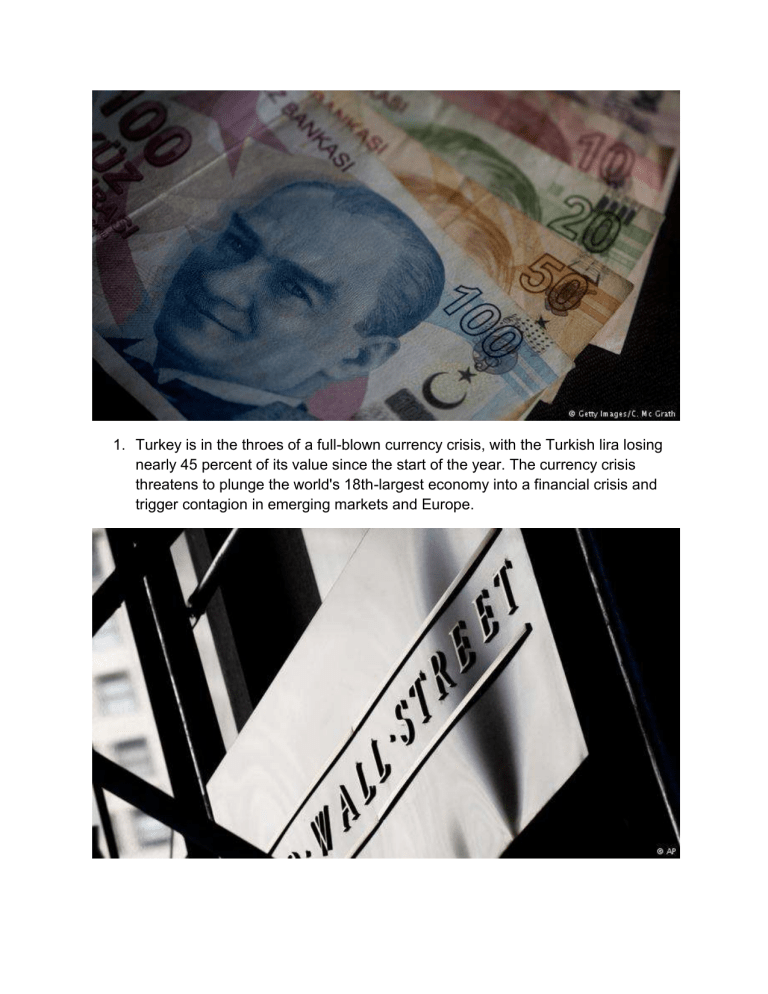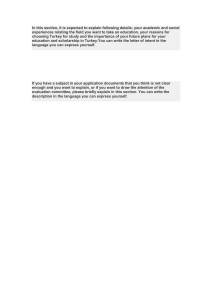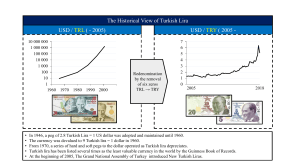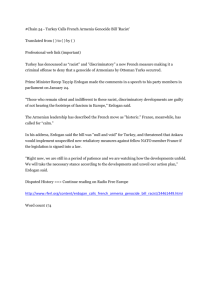
1. Turkey is in the throes of a full-blown currency crisis, with the Turkish lira losing nearly 45 percent of its value since the start of the year. The currency crisis threatens to plunge the world's 18th-largest economy into a financial crisis and trigger contagion in emerging markets and Europe. 2. Turkey has traditionally suffered from a large current account deficit. This difference between import and export of goods and services has been filled through external borrowing in foreign currency. A decade of easy money and low interest rates in the United States and EU following the 2008 financial crisis led to investors searching for higher yields to emerging markets like Turkey. 3. The external funds entered the Turkish economy to finance deficits, massive government spending and company borrowing. Credit-fueled growth helped the Turkish economy grow and boosted the government’s popularity through increased consumption and major construction projects. Here, road paint reads: "Slow down." 4. Reducing exposure to emerging markets Investors have pulled back money from emerging markets in recent months as the US Federal Reserve has steadily raised interest rates and is cutting back on easy money policies in response to a robust American economy. This has caused the dollar to increase, the lira to fall, and Turkish bond yields to rise. 5. Loss of confidence in Erdogan's strong hand The pressure on Turkey is reflective of broader trends in emerging markets, although the lira is by far the worst performer. That's because investors have lost confidence in management of the economy under President Recep Tayyip Erdogan, who believes in unorthodox economic policy, demands low interest rates and constantly assails "the interest rate lobby." Inflation is at 16 percent a year. 6. Trump's tweet shakes markets On August 10, US President Donald Trump announced higher tariffs on Turkish imports of steel and aluminum. The tariffs themselves are minor and impact around $1 billion (€875 million) in trade, but they weighed on market confidence in the vulnerable Turkish economy. Even more, Trump’s direct reference to the Turkish lira sent the currency tumbling. 7. Frenemies The imprisonment of US pastor Andrew Brunson has weighed heavily on relations, leading to a series of escalations. Ties between the two NATO allies have also nosedived over US support for Syrian Kurdish forces, Ankara's plans to buy a Russian missile system and Turkey's demand that Washington extradite US-based Islamic cleric Fethullah Gulen, whom Erdogan blames for the failed July 2016 coup bid. 8. One man show Poor relations between Washington and Ankara have added to Turkey's economic woes, but given broader fundamentals it is only a proximate cause of the market mayhem. More than 30 percent of the lira’s loss has come since June, when Erdogan took over the office with new sweeping powers. Erdogan's authoritarian hand has distanced the country from traditional Western allies and hit confidence. 9. Albayrak: the son-in-law After winning a June election, Erdogan spooked markets when he tightened his control over the central bank. Instead of appointing technocrats, Erdogan appointed his son-inlaw Berat Albayrak (pictured) to lead the newly empowered Finance Ministry. This has raised concerns over the central bank's independence given the president’s repeated statements against raising interest rates. 10. 'Economic war' Erdogan has not inspired confidence in responding to the lira meltdown. He speaks of "economic war" and a "campaign" waged by external powers designed to weaken Turkey. Instead of taking drastic action to shore up confidence, such as raising interest rates or going to the International Monetary Fund (IMF), the government is couching itself in nationalistic rhetoric of sacrifice. it is a relatively big country, with a population of 80 million and an economy four times as big as neighbouring Greece. Turkey’s geopolitical significance extends beyond the fact that it straddles Europe and Asia. As a member of Nato, it has traditionally been seen as part of the west’s defence against Russian expansionism. It is also currently the home to 3 million Syrian refugees, many of whom would like to be living in the European Union. Many emerging market economies borrowed heavily in dollars when American interest rates were at rock-bottom levels. The result was credit-driven growth, which starts to look fragile when – as now – the Federal Reserve is raising interest ratesand the dollar is strengthening. Erdoğan is one of the world’s current crop of self-styled strongmen leaders but has the misfortune to come up against someone who is a lot stronger than he is. Relations between Turkey and the US are not good. The White House is unhappy that Erdoğan has put in an order with Vladimir Putin to buy Russian rather than American missiles. When Donald Trump announced economic sanctions against Iran last week, Erdoğan pointedly refused to take part. And, so far, Turkey has refused to release an American pastor, Andrew Brunson, held on disputed terrorism charges. Erdoğan has insisted that he will not be browbeaten into submission but has few realistic options. To be sure, Turkey can seek to put pressure on Trump by saying that it will quit Nato and forge closer ties with Russia. Erdoğan could warn the EU that it will face a new inflow of migrants unless it intervenes on his behalf. It is clear what needs to happen. Turkey has to tackle the three causes of its current predicament: an overheating economy; Erdoğan’s attempts since his re-election in June to prevent the central bank from taking the necessary action to deal with rising prices; and the stand-off with the US Judging by his actions so far, Erdoğan’s next move will be to impose capital controls. However, as Paul Greer of Fidelity International notes, Turkey is a relatively open economy and requires a large amount of finance from overseas. Capital controls would not work on their own and would need to be supplemented by a rescue package from the International Monetary Fund. It’s either that, though, or a display of shock and awe from the central bank. Turkey is running out of options and running out of time. And that should be a concern for all of us. Interest rates are already at 17.75%, but with inflation poised to go to 20% over the coming months, are nowhere near high enough to put a floor under the lira. Holiday company Thomas Cook has seen a 63% rise in bookings to Turkey,while TUI said it was their third most popular destination meaning it was "well and truly back on the map as a top summer holiday location". https://mg.co.za/article/2018-08-14-turkey-us-a-timeline-of-plummeting-relations “There is a bit of overlap between corporate and government debt. A lot of the corporate debt is subject to a government guarantee, so the government has to pay if a corporation defaults,” Kirkegaard told Newsweek. “The Central Bank says there’s $130 billion in corporate debt, short-term rollover in the next 12 months. The number of corporations taking advantage of the government guarantee has been rising.” https://www.dw.com/en/turkeys-currency-crisis-explained/g-45071721



